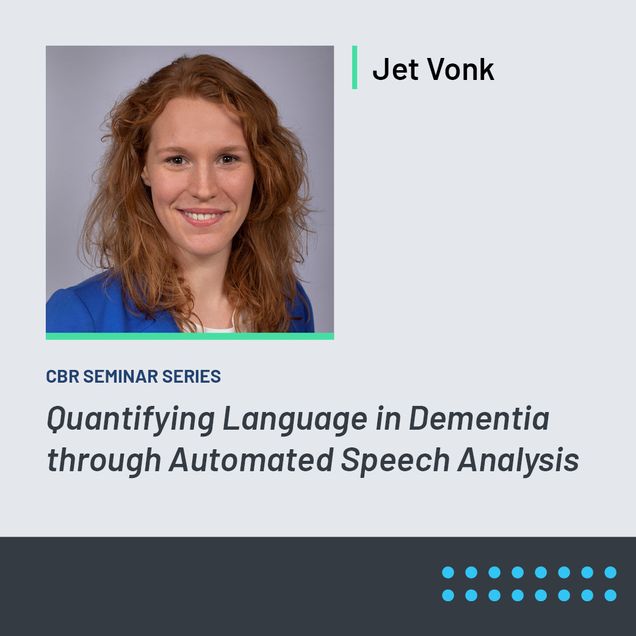News & Insights
Dr. Swathi Kiran on Neurorehab Resources and Insights Podcast
Dr. Swathi Kiran, founding director of the Center for Brain Recovery, was recently welcomed on the Neurorehab Resources and Insights podcast to speak with Drs. Jyutika Mehta and Marie McNeely about language recovery following stroke and traumatic brain injury. In this episode, titled "Finding Your Voice Again Through Speech Therapy with Dr. More

CBR Seminar Series: Alex Leff
CBR Seminar Series: Alex Leff, February 9, 2026 Title: Practice-induced changes in brain structure: evidence from two app-based trials in people with aphasia Abstract: People with acquired aphasia can improve their language abilities with impairment-based training, but the effects are usually item specific. We developed two apps, one for comprehension (Listen-In) and one... More
Progressing Parkinson’s Research: CBR’s Terry Ellis Receives $2M Grant to Study Wearable Device for Parkinson’s Gait
Center for Brain Recovery (CBR) faculty member Dr. Terry Ellis will be the Lead Investigator on a clinical research study awarded $2 million in grant funding from The Michael J. Fox Foundation for Parkinson’s Research. This study will assess the impact of MedRhythms’ MOVIVE (MR-005) on gait, mobility, and cognitive responses for... More

Student Spotlight: Michael Scimeca
Congratulations, Dr. Michael Scimeca! Michael Scimeca PhD mscimeca@bu.edu Profile Dr. Scimeca successfully defended his dissertation on January 7th, 2026, completing his PhD at Boston University's Sargent College in the Department of Speech, Language & Hearing Sciences. Throughout his doctoral studies, Scimeca was mentored by Dr. Swathi Kiran, director of the Boston University Center for Brain... More
Dr. Swathi Kiran Awarded 2025 Highly Ranked Scholar
Dr. Swathi Kiran, Founding Director of the Center for Brain Recovery, was awarded 2025 Highly Ranked Scholar status by ScholarGPS for her career accomplishments in the field of Aphasia, ranking within the top 0.05% of aphasia scholars based on publication impact, quantity, and quality. This marks the fourth consecutive year... More
Returning to College after Injury with a Change in Mindset: How ICCR Helped Theo Visco
December 18, 2025 Overcoming Injury Theo Visco was 20 years old and a sophomore in college when he experienced a helmeted ski accident on March 12th, 2025, that put him in a coma for five days. The accident had caused him to be unable to move the entire right side of his... More
CBR Attends the 2025 ASHA Convention
November 20, 2025 This year, three Center for Brain Recovery team members presented at the 2025 American Speech-Language-Hearing Association (ASHA) Convention, and one CBR PhD Student was awarded an ASHA Scholarship. Presentations Supporting Young Adults with ABI in Transition to Higher Education: Key Strategies for Success Jacquelyn Nardelli, Clinical Supervisor for the ICCR Program, More

CBR Seminar Series: Fatemeh Geranmayeh
CBR Seminar Series: Fatemeh Geranmayeh, December 15, 2025 Title: Online monitoring technology for deep phenotyping of cognitive impairment after stroke Abstract: Stroke remains one of the leading causes of death and disability worldwide, affecting over 12 million people annually and leaving many survivors with lasting cognitive and communicative impairments. Accurate, scalable monitoring of... More
The Washington Post: These creative activities may help slow down brain aging
The Washington Post recently quoted Dr. Stacy Andersen, a CBR Core Faculty member, about activities that can improve brain health and delay signs of aging. “Even if you don’t have exceptional longevity in your family, what our results show is that you still can improve your chances for cognitive health by... More
CBR Attends the Academy of Aphasia Annual Meeting 2025
October 26th – 28th, 2025 Eight researchers from the Boston University Center for Brain Recovery (CBR) attended the 63rd Annual Meeting of the Academy of Aphasia this October to present their work and gain new insights from peers in the fields of neuroscience and speech, language, and hearing sciences. Platform Sessions Shalom Henderson... More
AIAS Best Paper: Gaining Insight into Brain Damage and Rehabilitation through Digital Twins
October 27th – 28th, 2025 Center for Brain Recovery researchers Swathi Kiran (CBR Founding Director) and Risto Miikkulainen (CBR Affiliate) were invited to present their work in the Best Paper Presentation session at the 2025 Chen Institute Symposium for AI Accelerated Science (AIAS). Out of more than 60 submissions and 29... More
Student Spotlight: Manuel Marte
Congratulations, Dr. Manuel Marte! Manuel Marte PhD mjmarte@bu.edu Profile Dr. Marte successfully defended his dissertation on October 22nd, 2025, completing his PhD at Boston University's Sargent College in the Department of Speech, Language & Hearing Sciences. Throughout his doctoral studies, Manuel was mentored by Dr. Swathi Kiran, director of the Boston University Center for Brain... More

CBR Seminar Series: Jet Vonk
CBR Seminar Series: Jet Vonk, November 17, 2025 Title: Quantifying Language in Dementia through Automated Speech Analysis Abstract: Language offers a uniquely sensitive window into brain health, yet traditional approaches to its assessment have been manual, slow, and dependent on specialized expertise. This talk will discuss how automated speech and language analysis... More
Newly Released: The Cambridge Handbook of Language and Brain
The first edition of The Cambridge Handbook of Language and Brain was recently released and is now available to readers. This state-of-the-art handbook was co-edited by Dr. Swathi Kiran, Founding Director of the Boston University Center for Brain Recovery, and Dr. Edna Andrews from Duke University. This text serves as a... More
Learning in Action: Boston Public School Students Explore Research at CBR
November 7th, 2025 On Friday, November 7th, the BU Center for Brain Recovery (CBR) welcomed a group of juniors and seniors from various local Boston Public Schools (BPS). In an effort coordinated by BU’s Office of Government & Community Affairs in partnership with BU Admissions, BPS students visited Boston University’s campus, More